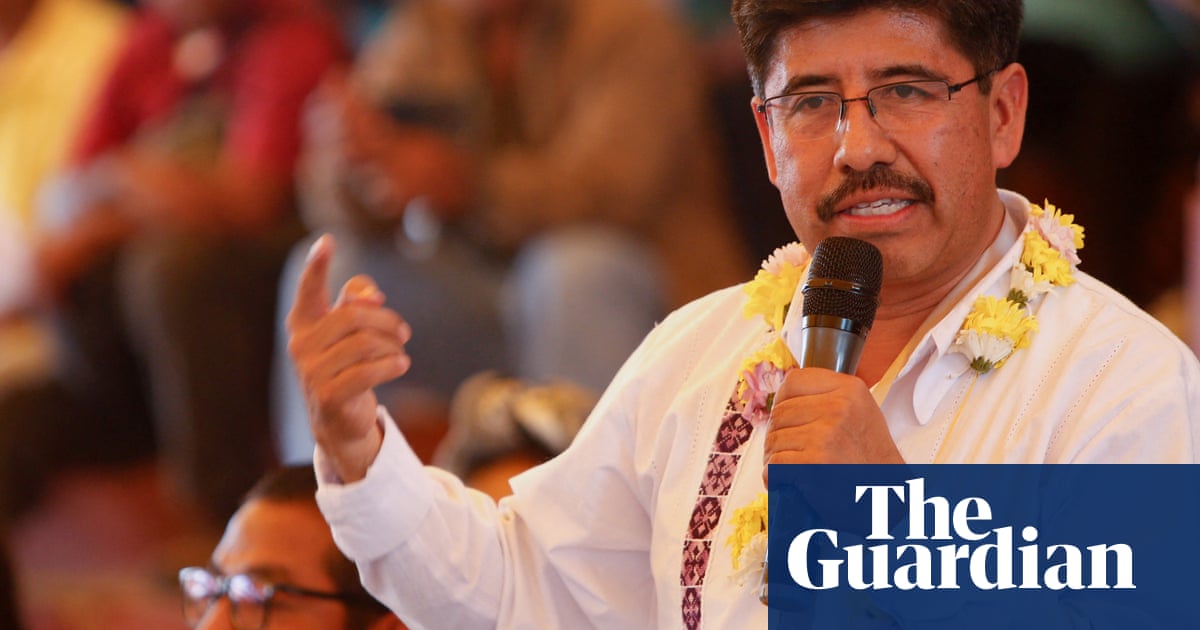Hugo Aguilar, who has links to governing party, topped unprecedented and controversial popular vote
An Indigenous lawyer from the state of Oaxaca is set to become the president of Mexico’s supreme court following the country’s unprecedented elections to appoint its entire judicial system by popular vote.
Activists hailed the election of Hugo Aguilar, a member of the Mixtec Indigenous group, as a symbolic victory – while noting that Aguilar, who topped the poll of candidates for the supreme court, had long since shifted from his own roots as an activist to a figure much more closely aligned with the state, and involved in controversial mega-projects such as the Maya Train.
“[Aguilar] is a brilliant lawyer,” wrote Joaquín Galván, a defender of Indigenous rights in Oaxaca, on X. “But while they say we the Indigenous are represented in him, in reality he has spent almost 20 years operating for the government, not for [Indigenous] peoples.”
Sunday’s vote was the result of a radical reform by the governing Morena party, which said it would reduce corruption and impunity in the judicial system by making it more responsive to popular opinion.
But the concept was challenged by critics who said it would destroy the separation of powers and could flood the judicial system with unqualified candidates backed by opaque interests. Many career judges chose not to run.
Roughly 2,600 posts, from local magistrates to supreme court justices, were up for grabs. Given the sheer number of positions and candidates involved, critics had warned that a low turnout was likely. Parts of the opposition also called for a boycott.
In the event, just 13% of Mexicans voted, a record low in a federal election.
“The turnout was frankly meagre,” said Javier Martín Reyes, a constitutional law professor at Mexico’s Unam university. “The government has tried to argue that voters were demanding this reform. But this has been proven false.”
Sheinbaum described the process as “a complete success”, adding: “Mexico is the most democratic country in the world.”
There was evidence of illegal party interference in the elections through the distribution of cheat sheets telling people how to vote, largely with the names of the government’s favoured candidates.
All nine of the new justices on the supreme court were included on such cheat sheets. Most have ties to the governing party, meaning it may no longer act as a check on Morena’s executive power, as it has in the past.
Aguilar is among them, having served as a senior official at the National Institute for Indigenous Peoples during the government of Sheinbaum’s predecessor, Andrés Manuel López Obrador.
One of Aguilar’s campaign promises was to promote justice for Indigenous communities and the environment – yet under López Obrador he coordinated consultations for mega-projects such as the Maya Train and the Interoceanic Corridor, a train-and-port system to connect trade between the Pacific and the Atlantic, that were riddled with irregularities.
Two other candidates with previous ties to Morena are María Ríos, who served as legal counsel to López Obrador when he was president, and Irving Espinosa, who was an adviser to Morena lawmakers.
Three sitting justices who decided to run were all re-elected: Lenia Batres, Yasmín Esquivel and Loretta Ortiz. All three were initially nominated by López Obrador and have largely voted in favour of Morena governments.
It is not certain how justices with past ties to Morena will vote, but if they band together they could give Sheinbaum a decisive majority on Mexico’s highest court.
Even those with more independent profiles might fear to go against the executive, said Martín Reyes.
“Morena and its allies have a supermajority – they can change the constitution at any moment, start political trials, remove [the justices’] immunity,” said Martín Reyes. “These people will live under the threat of sanction.”
The National Electoral Institute will continue to release results over the next week, including for the powerful new disciplinary tribune, tasked with supervising judges, and the top electoral court.
Preliminary results suggest Morena may have significant influence in the first of those, too.
“These elections were a failure and a success,” said Martín Reyes. “A failure in terms of democratic participation – but a success in terms of political capture.”
Source: www.theguardian.com
